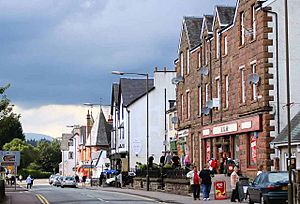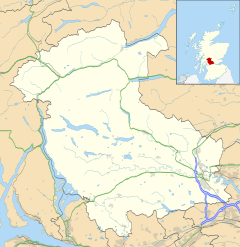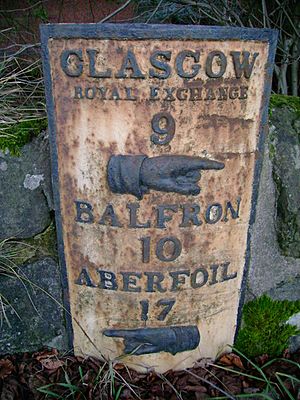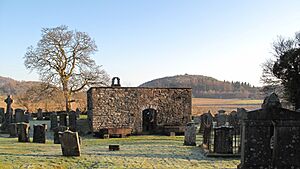Aberfoyle, Stirling facts for kids
Quick facts for kids Aberfoyle
|
|
|---|---|
 The main street in Aberfoyle |
|
| Population | 790 (2020) |
| OS grid reference | NN518012 |
| • Edinburgh | 49 mi (79 km) |
| • London | 366 mi (589 km) |
| Civil parish |
|
| Council area | |
| Lieutenancy area |
|
| Country | Scotland |
| Sovereign state | United Kingdom |
| Post town | STIRLING |
| Postcode district | FK8 |
| Dialling code | 01877 |
| Police | Central Scotland |
| Fire | Central Scotland |
| Ambulance | Scottish |
| EU Parliament | Scotland |
| UK Parliament |
|
| Scottish Parliament |
|
Aberfoyle (Scottish Gaelic: Obar Phuill) is a lovely village in Scotland. It is part of the Stirling area. This village is also in the historic county of Perthshire. Aberfoyle is about 27 miles (43 km) northwest of Glasgow.
The area around Aberfoyle is called the parish of Aberfoyle. In 2011, about 1,065 people lived there.
Contents
Exploring Aberfoyle's Geography
Aberfoyle is located on the River Forth. It sits at the bottom of a hill called Craigmore. Craigmore is about 387 meters (1,270 feet) high.
Since 1885, a special road has connected Aberfoyle to the Trossachs. This road is known as the Duke's Road or Duke's Pass. It was opened to the public in 1931. Now, it is a popular route for people visiting the Trossachs and Loch Katrine.
Nearby Lochs
- Loch Ard: This loch is about 2 miles (3 km) west of Aberfoyle. It is about 40 meters (130 feet) above sea level. Loch Ard is about 3 miles (5 km) long and 1 mile (1.5 km) wide. You can find a green island called Eilean Gorm there. There are also the beautiful Ledard Falls near its northern shore. The mountain Beinn an Fhogharaidh (616 meters or 2,021 feet) stands tall over the northern part of the loch.
- Loch Chon: About 2 miles (3 km) northwest of Loch Ard is Loch Chon. It is 90 meters (300 feet) above sea level. This loch is about 1.25 miles (2 km) long and 0.5 miles (800 meters) wide. Water from Loch Chon flows into Loch Ard. Then, the River Forth carries the water from Loch Ard.
What's in a Name? Aberfoyle's Origin
The name Aberfoyle likely comes from an old Celtic language. It means "mouth of the Phuill Burn." The Pow Burn is a small stream that flows into the River Forth at Aberfoyle.
Historically, the village's name was spelled in different ways. Some old spellings include Abirfull and Aberfoil. The current spelling, Aberfoyle, became common in the 1900s. The word "Phuill" or "Pol" means 'pool' or 'slow-moving water'.
Aberfoyle's Industries Over Time
For many years, Aberfoyle had important industries.
Past Industries
- Slate Quarries: From the 1820s to the 1950s, people worked in slate quarries on Craigmore. This was a very big industry for the village.
- Ironworks and Mills: An ironworks was set up in the 1720s. There were also places for spinning wool and making linen.
- Railway: From 1882, Aberfoyle had its own railway station. It connected the village to Glasgow. The station stopped carrying passengers in 1951. All train services ended in 1959.
Current Industries
Today, the old industries are gone. Aberfoyle now mainly relies on forestry and tourism.
Fun for Visitors: Tourism in Aberfoyle
Aberfoyle became popular with visitors after a famous poem was published. The Lady of the Lake by Sir Walter Scott came out in 1810. It described the beautiful Loch Katrine.
Aberfoyle calls itself "The Gateway to the Trossachs." It is a great place to start exploring nearby attractions. These include Loch Lomond and Inchmahome Priory. The priory is on an island in the Lake of Menteith.
- Tourist Information: There is a VisitScotland tourist office in the village center. You can get free information there. They also sell souvenirs and help book local places to stay.
- Aberfoyle Golf Club: This golf club was built in 1860. It is just south of the village.
- National Park: Aberfoyle is part of the Loch Lomond and The Trossachs National Park. This means it is in a protected area of natural beauty.
- Go Ape: Aberfoyle is home to the largest Go Ape adventure course in the UK. It even has the longest zip-line in the UK!
Famous People Connected to Aberfoyle
Aberfoyle has links to many interesting historical figures.
- Áedán mac Gabráin: An old Irish saint, Berach, once traveled to Aberfoyle. He wanted Áedán mac Gabráin to help settle a land problem.
- Rob Roy: This famous Scottish folk hero was born near Loch Katrine. He was known for moving cattle around the area. It is said that in 1691, his group took all the livestock from the village of Kippen. There is even a tree in Aberfoyle where Rob Roy supposedly hid from the law!
- Mary, Queen of Scots: As a child, Mary often visited Inchmahome Priory nearby. She also used the priory during her short time as queen. In 1547, she felt safe there from the English Army.
- Reverend Robert Kirk: Born in 1644, Rev. Kirk was a very important local figure. He was the first person to translate the entire Christian Bible into Scottish Gaelic. He is best known for his book, "The Secret Commonwealth of Elves, Fauns, and Fairies," published in 1691. Kirk had studied fairies for a long time. His book shared many personal stories of people who claimed to have met them.
Aberfoyle in Stories
Aberfoyle has also been used as a setting in several books.
- The adventure novel "Les Indes noires" by Jules Verne was inspired by Aberfoyle.
- The "Clachan of Aberfoil" is an important place in Walter Scott's novel Rob Roy.
- In Shadow Land by Adam Wright, two grandfathers from Aberfoyle are mentioned. The book suggests that people from Aberfoyle might have a touch of fairy blood!
See also
 In Spanish: Aberfoyle para niños
In Spanish: Aberfoyle para niños




